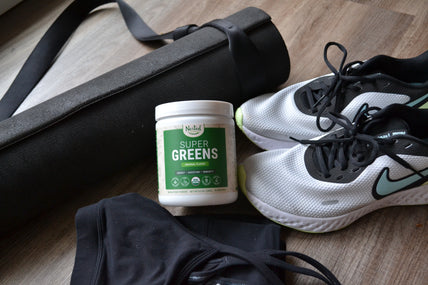Signs Your Liver Is Struggling

The liver is one of the largest organs in the human body, and also one of the most important.
Did you know: If a person’s liver were to shut down, they would likely die within a day.
That’s how vital the liver is – and yet, it’s also one of the least thought about organs we have. Considering how essential it is for our body’s overall health, though, perhaps it’s time we change our perceptions and start giving the liver the attention it deserves.
What does the liver do?

The liver’s main function is to filter our blood, removing toxins and other harmful substances from it, before passing it to the rest of the body.
The liver’s main function is to filter our blood, removing toxins and other harmful substances from it, before passing it to the rest of the body. It’s also responsible for about 500 other critical functions including fighting off infections, metabolizing drugs and creating energy from the food we eat.
Fun Fact: With the right time and care, the liver is actually able to regenerate itself, allowing your body’s filtration system to continue functioning effectively.
However, this does not mean that you should take it for granted. Some liver conditions can leave permanent damage – and in these cases, early diagnosis and swift treatment can mean the difference between an uncomfortable illness or a life-threatening emergency.
Signs that your liver might be struggling
Experts estimate that about 10%-30% of Americans have one of over 100 types of liver disease – but the majority of these people don’t even realize it. Often, the early signs of a struggling liver or associated signs of liver diseases can be subtle, or easily mistaken for something else.
If you find yourself experiencing any of these common symptoms, it may be time to talk to your doctor and seek medical advice:
- Yellow eyes/skin (jaundice) – When your body breaks down old blood cells, one of the byproducts created is a yellowish compound called bilirubin. While a healthy liver has no problem disposing of bilirubin, a failing liver allows it to build up in the blood – which can turn your eyes and skin yellow.
- Abdominal pain or swelling – If you feel sore, swollen or achy in the right upper quadrant of your abdomen, it may be a sign that your liver is damaged or inflamed. The pain can be throbbing or stabbing, and it can come and go.
- Persistent fatigue – Persistent tiredness or malaise is almost always a sign that something’s not right with your body. In the case of a failing liver, severe exhaustion could point to low blood oxygen levels or waste accumulation.
- "Spider veins" – Also called “spider nevus”, these are a type of swollen blood vessels found underneath the skin. Typically, they look like a central red spot with wavy lines radiating outwards (like a spider web). If your liver is not properly cleaning your blood, you could have clotting issues near the surface of your skin that cause these markings, which are commonly found on the chest and torso.

Prescription medications, including antibiotics, can drag our liver down. So can bottomless margaritas (no judgement!) and processed foods.
Things that damage the liver
Over time, some of these common bad habits may cause gradual damage or harm to your liver:
- Excessive alcohol consumption – You probably already know this, but excessive alcohol consumption is your liver’s worst enemy, decreasing its ability to remove toxins from the body. Alcoholic fatty liver disease happens when a build-up of excess fat in the liver is accompanied by liver inflammation.
- Obesity/poor nutrition – Obesity and poor eating habits can harm your liver over time. Inadequate nutrition and a diet high in trans fats can contribute to fatty liver disease (where excess fat builds up on and around the organ). Sometimes, this can lead to cirrhosis of the liver, which is scarring of the liver.
- Sleep deprivation – According to a study published in the Journal of Anatomy, sleep deprivation can cause oxidative stress to the liver. Also, if you’re sleep deprived, your liver may not process fat as efficiently, instead allowing it to accumulate and increasing your risk of fatty liver disease.
- Smoking – The toxic chemicals found in cigarette smoke can also cause oxidative stress to the liver, which damages healthy liver cells and aggravates existing liver disease. The smoke can also impair the liver’s ability to repair itself, and make it less effective at removing toxins from the body.
- Overuse of medications – Continuous and prolonged consumption of certain prescription medications can gradually harm the liver over time. One of the biggest offenders in this category is acetaminophen, which is commonly found in Tylenol and other over-the-counter cold and flu remedies. While the substance is generally considered to be safe, taking it in high doses over several days can cause severe liver damage. (Note: Always check the label of any medication or supplement for warnings regarding possible liver damage.)
As you can see, the liver plays a vital role in fuelling, protecting, and policing activities in your body. It’s important to treat it right, so it can stay healthy and do its job.
Here are some ways to naturally keep your liver in good shape:
- Eat a liver-loving diet –When it comes to supporting your liver, it’s best to stick to a low-sugar, low-toxin diet that’s filled with high-fiber foods. This includes fruits, vegetables and lots of leafy greens. The liver benefits from having lots of vitamins and minerals, which help it to perform its many functions. High amounts of antioxidants and fiber can even potentially help reverse liver damage and disease.
- Focus on fresh foods – The quality of your diet is also important. Avoid non-organic foods or produce which are more likely to carry toxins, antibiotic residue and synthetic hormones that your liver then needs to remove. Eat organic foods where possible, and eliminate processed foods from your diet to give your liver a break.
- Use liver-boosting supplements – There are many herbal supplements which can help strengthen liver health and function: like milk thistle. As a liver support and aid, Milk Thistle is a powerful detoxifier and anti-inflammatory. It also helps provide digestive support, is rich in antioxidants and can even be used by nursing mothers to improve breastmilk production naturally. Other natural supplements that may help give your liver a boost are dandelion root, turmeric, globe artichoke and slippery elm, to name a few.
- Reduce stress – Most people are aware that stress affects their health negatively, but not many know that it can affect the liver as well. High amounts of chronic stress can have an impact on your endocrine, reproductive, digestive and immune systems, while physiologically, the impact of stress causes fat accumulation in the liver and may worsen liver disease. As such, it’s important to manage and reduce your stress, in order to help protect and support your liver.



